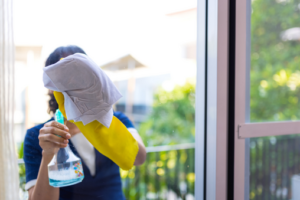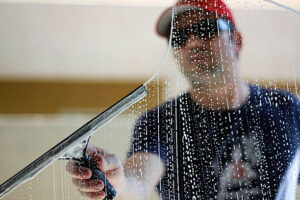Do you want to make sure your windows are sparkling clean? commercial window washing in Denver is a tedious task but the right window cleaning solution can make it easier. Whether you’re looking for an eco-friendly option or a more powerful cleaner, mixing the perfect window cleaning solution is essential to get the job done. In this article, you will learn how to mix window cleaning solutions and create the perfect mixture for your needs.
Essential Materials Needed
 When it comes to window cleaning, having the right materials is essential. Cleaning services and house cleaners often use a pressure washing machine to get the job done quickly and efficiently. This type of machine will mix water with laundry detergent and create a perfect cleaning solution for windows.
When it comes to window cleaning, having the right materials is essential. Cleaning services and house cleaners often use a pressure washing machine to get the job done quickly and efficiently. This type of machine will mix water with laundry detergent and create a perfect cleaning solution for windows.
The supplies needed to make this window cleaning solution are easy to obtain. All that’s required is hot tap water, laundry detergent, and a pressure washer. It is important to note that not all laundry detergents work in this type of machine, so be sure to get one specifically designed for pressure washers.
Once the supplies are gathered, it’s time to start mixing the solution. Follow instructions on the pressure washer for proper measurement ratios; it will usually involve measuring out a certain amount of laundry detergent per gallon of water. After everything is added in, turn on the pressure washer and let the mixture do its job! With the right materials, creating a window cleaning solution can be simple and hassle-free.
Safety Precautions
It is important to take safety precautions when mixing window cleaning solutions. Cleaning services and house cleaners should always be aware of any potential risks before beginning a project. While pressure washers are designed for this purpose, they can be dangerous when not used properly.
Before mixing the solution, users should put on eye protection and gloves to protect themselves from any harmful chemicals in the laundry detergent. It is also important to ensure that the area around the pressure washer is clear of debris or other objects that could be blown away during use. The pressure washer should also be placed on a stable surface, such as concrete or asphalt, and not on grass or dirt.
Finally, it is essential to read all instructions carefully before using the machine and to follow them accordingly. If any questions arise while working with the washing machine, it is best to consult a professional cleaning service for help. With proper safety measures in place, mixing window cleaning solution can be done safely and efficiently.
Types Of Cleaners To Use
When it comes to choosing the best window cleaning solution for the job, there are a few key factors to consider. Different types of cleaners can provide different levels of cleaning power and effectiveness. Additionally, some solutions may be better suited for certain types of surfaces than others. It is important to understand which type of cleaner will work best for the job at hand.
The two most common types of cleaners used in window cleaning are detergents and degreasers. Detergents are often preferred because they are non-corrosive and have a milder smell than other cleaners, such as ammonia or bleach. However, detergents do not always provide the highest level of cleaning efficacy and may require additional scrubbing for tougher dirt or grease-based stains. Degreasers, on the other hand, can usually remove stuck-on gunk with little effort but may contain harsher chemicals that could damage certain surfaces if used improperly.
Regardless of which type of cleaner is chosen, proper safety precautions should still be taken when using them around windows or other delicate surfaces. Care should also be taken to ensure that any leftover solution is properly disposed off afterwards to avoid environmental contamination. With the right cleaner in place, mixing and using window cleaning solution can be done quickly and effectively with minimal risk involved.
How To Choose The Right Cleaner
Choosing the right cleaner for window cleaning is an important part of ensuring that the job is done correctly and safely. There are many different types of cleaners available, so it’s important to understand the characteristics of each one in order to make the best choice. The type of cleaner chosen will depend on the surface being cleaned and the level of cleaning power needed.
When selecting a cleaner for window cleaning, it’s important to consider both the effectiveness and safety of the product. Detergents are usually preferred because they are non-corrosive and have milder smells compared to other cleaners, such as bleach or ammonia. On the other hand, degreasers can provide more powerful cleaning but may contain harsher chemicals that could damage certain surfaces if used improperly. It’s also important to check the labels and directions of any product before using them on windows or other delicate surfaces in order to avoid any potential harm or damage.
Ensuring that you choose a suitable cleaner is just one step in creating an effective window cleaning solution. Once you have selected your preferred cleaner, it is then time to mix it with water in order to create a solution that is safe for use around windows. Knowing how much cleaner and water to use will depend on what type of surface needs to be cleaned, as well as personal preference for strength. When mixing your own window cleaning solution at home, always remember to take proper safety precautions when handling any chemicals or liquids near windows or other surfaces that could be damaged by accidental spills or splashes.
Choosing The Correct Concentration Of Cleaner
Once the right cleaner has been selected, it is important to determine the correct concentration of cleaner to use in the window cleaning solution. The amount of cleaner used will vary depending on the surface being cleaned and the desired level of cleanliness. For most windows, a ratio of one part cleaner to 20 parts water is usually sufficient. However, if more powerful cleaning is required, then a higher concentration of cleaner may be necessary. It’s also important to remember that different types of cleaners may require different concentrations in order to be effective.
When mixing a window cleaning solution, it’s best to start with a small amount and increase as needed until you achieve the desired results. This will help ensure that you don’t end up with an overly strong or too weak solution. Additionally, always make sure you read any directions or safety information provided on the label before using any cleaners near windows or other delicate surfaces.
To ensure a safe and effective window cleaning solution, it’s important to select an appropriate cleaner and know how much cleaner and water to use when mixing your own solution at home. Taking these steps can help reduce potential damage while providing a greater degree of cleanliness for windows and other surfaces around your home or business.
Combining Different Cleaners For A Better Result
 In some cases, combining different cleaners can provide a better result. For instance, if you’re attempting to remove grease and dirt from windows, then a combination of glass cleaner and degreaser may work best. Similarly, if you’re dealing with hard water buildup or mineral deposits on windows, then a combination of glass cleaner and vinegar may be the solution. The combination of these two cleaners can help break down the minerals and lift away any residue that remains.
In some cases, combining different cleaners can provide a better result. For instance, if you’re attempting to remove grease and dirt from windows, then a combination of glass cleaner and degreaser may work best. Similarly, if you’re dealing with hard water buildup or mineral deposits on windows, then a combination of glass cleaner and vinegar may be the solution. The combination of these two cleaners can help break down the minerals and lift away any residue that remains.
When using multiple cleaners in one window cleaning solution, it’s important to pay close attention to safety instructions and dilution ratios. This will help ensure that the mixture is safe to use without causing damage to the window or its surrounding area. Additionally, it’s important to avoid mixing chemical cleaners together as this could produce hazardous fumes or other dangerous reactions.
With careful consideration and preparation, combining different cleaners in one window cleaning solution can be an effective way to achieve a deep clean while also protecting delicate surfaces from potential damage in commercial window cleaning in Denver. It’s always best to make sure you read all safety instructions before using any type of chemical cleaner near windows or other surfaces around your home or business.
Best Practices For Mixing Solution
When combining different cleaners for a window cleaning solution, it’s important to pay attention to safety instructions and dilution ratios. By following the directions on each cleaner’s label, you can ensure that your mixture is safe to use without causing any damage or harm to the window or surrounding area. Additionally, it’s never a good idea to mix chemical cleaners together as this could produce hazardous fumes or other dangerous reactions. Here are some best practices for mixing a window cleaning solution:
First, make sure you read all safety instructions before using any type of chemical cleaner near windows or other surfaces around your home or business. Next, calculate the ratio of each cleaner based on the surface and type of dirt being removed. For example, if you’re dealing with grease and dirt then glass cleaner and degreaser should be mixed in equal parts. Finally, always test a small area before applying the mixture to larger surfaces so you can be sure that it won’t cause any damage.
By taking the time to properly prepare and mix a window cleaning solution, you can achieve optimal results while protecting delicate surfaces from potential damage. With proper care and attention, combining different cleaners in one solution can be an effective way to achieve a deep clean with minimal effort.
Benefits Of Using Homemade Solutions
In addition to following best practices for mixing window cleaning solutions, many people choose to make their own homemade solutions. This can provide several benefits, including cost savings, easy access to ingredients, and a sense of satisfaction in doing something yourself.
Using homemade solutions also eliminates the need to purchase multiple cleaners for different surfaces or tasks. Instead of buying separate cleaners for glass, countertops, and appliances, you can create one solution that will work on all of them. Many commonly used ingredients such as vinegar, baking soda, and dish soap are often already available in most households and can be combined into an effective cleaner without having to make a trip to the store.
Creating your own window cleaning solution is also a great way to reduce waste by using reusable containers instead of purchasing single-use disposable bottles. Plus, it’s satisfying to know that you created something yourself that works just as well as any pre-mixed cleaner from the store. All in all, making your own cleaner is an economical and eco-friendly option that can save time and money while still providing excellent results.
Advantages Of Professional Window Cleaning Solutions
While making your own window cleaning solution has many advantages, there are also advantages to using professional solutions. Professional window cleaners are designed specifically for windows and often contain ingredients like surfactants and solvents that make them more efficient at breaking down dirt, grime, and streaks. They’re also more concentrated than homemade solutions, so you don’t need as much of it to get the job done.
In addition, many professional solutions come in pre-measured bottles or pouches, which makes them easier to use than homemade mixes. It also eliminates the guesswork from measuring out the ingredients yourself and ensures that you’re using the right amount of each ingredient for optimal results. With pre-mixed solutions, you can be confident that your windows are being cleaned correctly and efficiently every time.
Finally, professional window cleaning solutions can provide peace of mind knowing that they have been tested and approved by experts in the field. This means that you don’t have to worry about accidentally using too much of an ingredient or creating a solution that is ineffective or potentially damaging to your windows. Professional cleaners are created with safety in mind and are generally more reliable than homemade options.
What To Avoid In Making A Window Cleaning Solution
When it comes to creating your own window cleaning solution, there are a few things you should avoid. For starters, never use abrasive cleaners on your windows, as this can scratch the surface and damage them over time. Additionally, don’t combine ingredients that shouldn’t be mixed together; for instance, bleach shouldn’t be mixed with ammonia as it can create hazardous fumes. Finally, avoid using harsh chemicals like acids and lye on your windows as these can corrode or discolor them.
It’s also important to remember that not all windows can handle the same solutions or concentrations of ingredients. Be sure to read the manufacturer’s instructions before making any adjustments to the cleaner or diluting it. This will ensure that you are using the right product and concentration for your particular type of window.
When in doubt, opt for a commercial window cleaning solution instead of making your own. Professional products are specially designed to clean windows safely and efficiently without risking damage to their surfaces. Plus, they come in pre-measured doses so you don’t have to worry about measuring out the ingredients yourself—a huge time-saver!
Duration And Frequency Of Cleaning
Cleaning windows regularly is an important part of maintaining them and keeping them looking good. How often you clean your windows depends on the environment they’re in and how much dust, dirt, and debris they come into contact with. In general, it’s a good idea to give your windows a thorough cleaning at least once a month. If they’re exposed to more dirt than usual or are in an area that experiences extreme temperatures or weather conditions, then you may need to clean them more often.
When you do clean your windows, be sure to take your time and use the appropriate cleaning solution for the job. Use a soft cloth or microfiber mitt to wipe away any dirt and grime from the surface of the window, then rinse off with clean water. When drying off the window after washing it, use a squeegee for best results. This will help prevent streaks from forming on the glass and leave your windows sparkling clean!
Proper window care is essential for keeping them looking their best over time. With regular cleaning and maintenance, you can ensure that your windows stay clear and free of dirt and grime for years to come.
Tips On Storing And Reusing Window Cleaning Solutions

When it comes to storing and reusing window cleaning solutions, there are a few tips that can help ensure you get the most out of your cleaning solution. First, make sure to store any unused solution in a cool, dry place, away from direct sunlight. This will help keep the cleaning solution from breaking down too quickly and becoming less effective. When using a cleaning solution more than once, be sure to give it a good shake before applying it to the window. This will help mix up any sediment that has settled at the bottom of the container and allow for better coverage when wiping down your windows.
It’s also important to note that not all window cleaning solutions are made equal. Different brands may have different ingredients or concentrations of chemicals that could affect their effectiveness on certain surfaces. Be sure to read the label carefully before purchasing so you can find one that’s best suited for your needs. Additionally, don’t be afraid to experiment with different types of cleaners if one doesn’t seem to work as well as you’d like.
Finally, always remember to use proper safety precautions when working with any type of chemical cleaner – wear gloves and protective eyewear when necessary, and make sure the area is adequately ventilated during use. Taking these steps will help ensure that you get the most out of your window cleaning experience while still staying safe!
So if you’re ready to see the difference that clean windows can make in your home’s appearance, contact Signature Window Washing today! We offer competitive pricing and exceptional service, and we’re confident that you’ll be thrilled with the results. Our team of expert window washers Denver will take the hassle and stress out of window cleaning, leaving your home looking beautiful and inviting. Don’t wait – call us now to schedule your appointment and get your windows looking their best.
Environmental Considerations When Making Window Cleaning Solutions
In addition to convenience and cost-effectiveness, there are a variety of environmental considerations when making and using window cleaning solutions. To begin with, try to choose a cleaner that’s made from natural ingredients whenever possible. This will help reduce the amount of harsh chemicals released into the environment during use. Additionally, consider using reusable spray bottles to store your window cleaning solution so that you don’t have to worry about disposing of empty chemical containers after each use.
When making your own window cleaning solution, be sure to research any potential health and safety risks associated with the ingredients you’re using before combining them. It’s also important to remember that homemade cleaners won’t necessarily be as effective as commercially available cleaners, so you may need to use more product or longer exposure times for optimal results. Finally, before applying any type of window cleaner, make sure to test it in an inconspicuous area first in order to ensure you’re getting the desired results without damaging the surface of your windows or surrounding materials.
Troubleshooting Problems With Your Window-Cleaning Solution
If you’ve made your own window cleaning solution, it’s important to troubleshoot any problems that may arise during use. If the solution isn’t working as expected, there are a few steps that can be taken to help improve performance. Firstly, make sure that all surfaces are thoroughly wet before applying the cleaner and check that the solution isn’t too diluted or overly concentrated; either of these can reduce its effectiveness. Additionally, try using a soft cloth to gently scrub away any dirt and debris before rinsing with clean water and drying with a lint-free towel.
It’s also possible that some ingredients in the window cleaning solution may be incompatible with certain materials. When this happens, the cleaner can cause streaks or leave behind an unpleasant residue. In such cases, it might be best to switch to a commercially available window cleaner or experiment with different ratios until you find one that works without damaging your windows or surrounding areas.
When dealing with stubborn stains or dirt buildup, adding in a mild abrasive like baking soda can help break down tough grime without scratching surfaces. This method is especially effective for removing soap scum from glass shower doors or ceramic tiles. However, when using an abrasive cleaner it’s important to take extra care and test a small area first to ensure it won’t damage your surfaces. With some patience and experimentation, you should be able to find a window cleaning solution that works for you and gets your windows sparkling clean again!
Alternatives To Traditional Window-Cleaning Solutions
If you’re looking for an alternative to traditional window-cleaning solutions, there are several options you can try. One popular option is to use a mixture of white vinegar and water. This solution works well on most surfaces and is great for cutting through grease and grime. Simply dilute the vinegar with an equal amount of water, apply it with a soft cloth or sponge, then rinse off with clean water and dry with a lint-free towel.
Another option is to use lemon juice or lemon essential oil mixed with warm water as a natural window cleaner. Lemon has natural antibacterial properties that make it effective at removing dirt and bacteria from windows without leaving behind streaks or residue. To use this method, mix two parts warm water with one part lemon juice or one drop of essential oil per cup of warm water. Then apply the mixture to the area using a soft cloth, scrubbing lightly if needed, before rinsing off with clean water and drying with a lint-free towel.
When it comes to cleaning windows, there are plenty of alternatives available that don’t require harsh chemicals or expensive store-bought cleaners. Whether you’re using a simple vinegar-water solution or something more natural like lemon juice, these methods can help keep your windows looking spotless while being gentle on both your wallet and the environment!
Conclusion

Window-cleaning solutions are an important part of keeping your windows looking clean and clear. With the right materials, safety precautions, and knowledge of how to mix the solution correctly, you can easily create an effective cleaning solution for your windows. By considering the environment when making and using a window-cleaning solution, you can ensure that you’re not negatively impacting your surroundings. If you run into any problems with your window-cleaning solution, there are various troubleshooting tips that can help you get back on track. Additionally, if traditional window-cleaning solutions don’t fit your needs, there are several alternatives available.
Whether you need interior or exterior window cleaning Arvada, we’ve got you covered. Our team uses only the best equipment and techniques to ensure a job well done every time. Plus, we take extra care to protect your home and property while we work, so you can have peace of mind knowing that your investment is in good hands. Contact Signature Window Washing today
Overall, it’s important to understand how to mix a window-cleaning solution in order to maintain clean windows without compromising the environment or risking harm to yourself or others. With just a few essential steps and ingredients, cleaning your windows can be easy and safe. Taking the time to familiarize yourself with different types of cleaners and their concentrations will ensure that you have the necessary knowledge for creating the perfect window-cleaning solution for any job.

Recent Comments